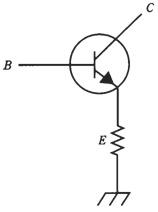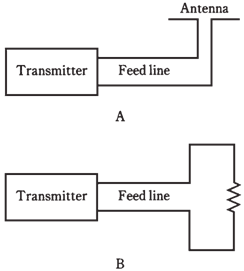Power dissipation
Dissipating power as heat is not bad always, sometimes a resistor can be used as a dummy component, so that the circuit "sees" the resistor as if it were something more complex. In radio, for instance, a resistor can be used to take the place of an antenna. A transmitter can then be tested in such a manner that it does not interfere with signals on the airwaves. The output of transmitter heats the resistor, without radiating any signal. But as far as transmitter knows, it is linked up to the real antenna.
The other case in which power dissipation is useful is at input of the power amplifier. At times the circuit driving the amplifier has too much

Figure-- Current-limiting resistor for a transistor.

Figure-- At A, a transmitter is hooked up to a real antenna; at B, to a resistive dummy antenna.
power for amplifier input. A resistor, or network of resistors, can dissipate this excess power so that the power amplifier does not get too much drive.